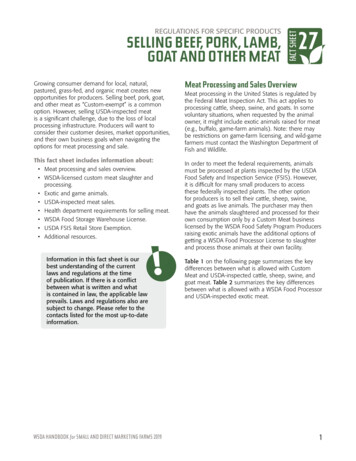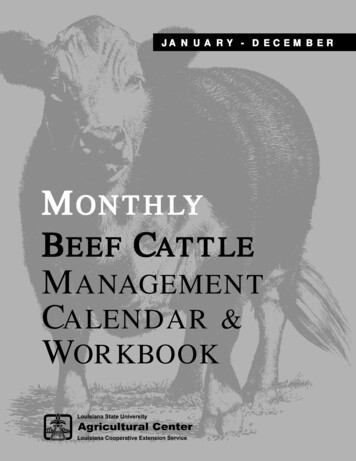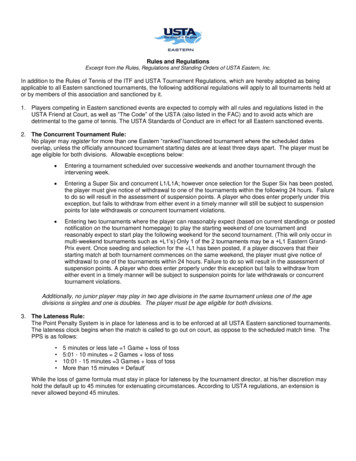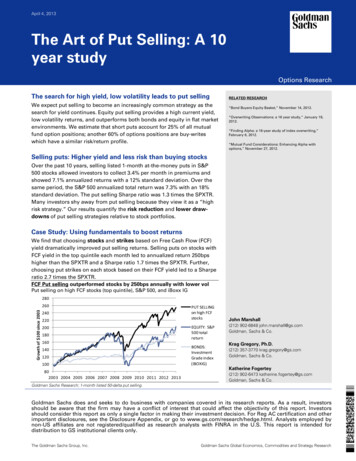
Transcription
REGULATIONS FOR SPECIFIC PRODUCTSSELLING BEEF, PORK, LAMB,GOAT AND OTHER MEATGrowing consumer demand for local, natural,pastured, grass-fed, and organic meat creates newopportunities for producers. Selling beef, pork, goat,and other meat as “Custom-exempt” is a commonoption. However, selling USDA-inspected meatis a significant challenge, due to the loss of localprocessing infrastructure. Producers will want toconsider their customer desires, market opportunities,and their own business goals when navigating theoptions for meat processing and sale.This fact sheet includes information about: Meat processing and sales overview. WSDA-licensed custom meat slaughter andprocessing. Exotic and game animals. USDA-inspected meat sales. Health department requirements for selling meat. WSDA Food Storage Warehouse License. USDA FSIS Retail Store Exemption. Additional resources.Information in this fact sheet is ourbest understanding of the currentlaws and regulations at the timeof publication. If there is a conflictbetween what is written and whatis contained in law, the applicable lawprevails. Laws and regulations also aresubject to change. Please refer to thecontacts listed for the most up-to-dateinformation.WSDA HANDBOOK for SMALL AND DIRECT MARKETING FARMS 201927Meat Processing and Sales OverviewMeat processing in the United States is regulated bythe Federal Meat Inspection Act. This act applies toprocessing cattle, sheep, swine, and goats. In somevoluntary situations, when requested by the animalowner, it might include exotic animals raised for meat(e.g., buffalo, game-farm animals). Note: there maybe restrictions on game-farm licensing, and wild-gamefarmers must contact the Washington Department ofFish and Wildlife.In order to meet the federal requirements, animalsmust be processed at plants inspected by the USDAFood Safety and Inspection Service (FSIS). However,it is difficult for many small producers to accessthese federally inspected plants. The other optionfor producers is to sell their cattle, sheep, swine,and goats as live animals. The purchaser may thenhave the animals slaughtered and processed for theirown consumption only by a Custom Meat businesslicensed by the WSDA Food Safety Program Producersraising exotic animals have the additional options ofgetting a WSDA Food Processor License to slaughterand process those animals at their own facility.Table 1 on the following page summarizes the keydifferences between what is allowed with CustomMeat and USDA-inspected cattle, sheep, swine, andgoat meat. Table 2 summarizes the key differencesbetween what is allowed with a WSDA Food Processorand USDA-inspected exotic meat.1
REGULATIONS FOR SPECIFIC PRODUCTSTable 1. WSDA-licensed Custom Meat vs. USDA-Inspected MeatSPECIES: CATTLE, SHEEP,SWINE, AND GOATSWhat can be sold?Marketing options?Are out-of-state sales allowed?WSDA-LICENSED CUSTOM MEATUSDA-INSPECTED MEATdirect to end consumerwhile animal is livedirect, retail and wholesaleNoYeseighth, quarter, half, orwhole portions sold of live animal*whole, primal, or meatprocessed into cuts*Portions can be less than one-eighth as long as paperwork records document that the animal is fully owned bythe multiple customers before slaughter.Table 2. WSDA-licensed Food Processor vs. USDA-Inspected MeatSPECIES: EXOTIC, INCLUDING BUFFALO,BEEFALO, GAME-FARMED BIRDSWSDA-LICENSED FOOD PROCESSORWhat can be sold?whole, primal, or meatprocessed into cutsUSDA VOLUNTARYINSPECTION **Marketing options?direct, retail and wholesaledirect, retail and wholesaleAre out-of-state sales allowed?Yes*Yeswhole, primal, or meatprocessed into cuts*Yes, only if the receiving state allows non-USDA inspected exotic meats.**USDA may or may not agree to conduct voluntary inspection.WSDA-licensed Custom Meat Slaughter andProcessingUSDA’s Custom Meat exemption allows for slaughterof and processing of meat for personal consumption.Under this exemption, producers can sell animalsby live weight directly to the end consumer prior toslaughter (when still alive). Under the Custom Meatexemption, cattle, swine, sheep, and goat can be soldas whole, halves or quarters for the sole consumptionof the owner. Meat is “uninspected” and cannotbe resold. Selling meat by the piece or cut is notallowed under the Custom Meat exemption. All sales,slaughter, cut, and wrap must occur in WashingtonState.Custom Meat is “uninspected” because it is notprocessed in a USDA-inspected facility. All packagedmeat must be labeled “not for sale.” Only theowner of the animal (i.e., the meat customer), theirimmediate family or non-paying guests may consumeit. Custom Meat cannot be sold at farmers markets, torestaurants, or to grocery stores. Likewise, it cannot bedonated to food banks.2Custom Meat animals must be slaughtered by peoplelicensed by the WSDA Food Safety Program. On-farmslaughter is possible if the licensed custom farmslaughter uses a WSDA-approved mobile CustomFarm Slaughtering unit (i.e., meat truck). Animalsmay also be processed at a fixed Custom SlaughterEstablishment licensed by WSDA to slaughter meatfood animals for the owner. After slaughter, carcassesare tagged and delivered to a WSDA-licensed CustomMeat Facility for cutting and wrapping, aging, andfreezing. Individual customers wanting specific cutsmust call this facility with directions on how to cut thecarcass. Customers also arrange to pick up their meatat the Custom Meat Facility.Producers are advised to schedule butcher dateswell in advance with their Custom Farm Slaughterer,especially during the busy season (August throughNovember). In addition, producers need to ensurethat space will be available for their animals at the cutand-wrap facility on the day of slaughter.For a list of WSDA-licensed Custom Slaughter andCustom Meat Facilities, contact the Food SafetyProgram by calling 360-902-1876 or emailingSELLING BEEF, PORK, LAMB, GOAT AND OTHER MEAT FACT SHEET 27
REGULATIONS FOR SPECIFIC PRODUCTSfoodsafety@agr.wa.gov. Additional information is alsoavailable by searching the WSDA website, agr.wa.gov.At the time of printing, WSDA licensees included: 69 Custom Farm Slaughterers 18 Custom Slaughter Establishments (fixedfacility) 103 Custom Meat Facilities (cut and wrap)Exotic and Game Animals Exotic animalmeat (e.g., buffalo, beefalo, game-farmed birds)can be sold within Washington State whenslaughtered and processed at a WSDA-licensedfood processing facility or under voluntaryinspection at a USDA-inspected plant and atthe request of the animal owner. To sell exoticanimal meat outside Washington State, animalsmust be processed at a facility that has a USDAgrant of inspection for that particular species.In some cases, processing for out-of-state salesmay occur at WSDA-licensed food processingfacility, if the receiving state will accept nonUSDA processed exotics.A WSDA-licensed food processing facilitycan process a hunter’s game animal for thesole use of the hunter’s family or guests.This meat cannot be sold.Elk and deer farms are not allowed inthe state of Washington. The WashingtonDepartment of Fish and Wildlife prohibitsthe transport of elk and deer intoWashington for processing.USDA-Inspected Meat SalesUSDA inspection is required to sell meat fromlivestock (as opposed to selling live animals) andanimal products through retail outlets, by the cut, oracross state lines. Only USDA-inspected meat can besold in retail or wholesale markets. The major benefitof meat processed at USDA-inspected facilities is thatit may be sold at farmers markets, to restaurants, andto other wholesale and retail outlets. Producers musthave the animals slaughtered and processed in USDAinspected facilities. Some facilities require a minimumhead number or work only on contract, and manyprocess only beef.For information regarding USDA-inspected facilities inthe Pacific Northwest, contact the USDA Food Safetyand Inspection Service District Office (for WashingtonSELLING BEEF, PORK, LAMB, GOAT AND OTHER MEAT FACT SHEET 27State) in Denver, Colorado at 303-236-9800, or usethe USDA FSIS online “Meat, Poultry and Egg ProductInspection Directory.” Find it in the menu atfsis.usda.gov, or search for it by name.USDA-Inspected Mobile Slaughter UnitsGiven the limited USDA inspected meat processingfacilities available, USDA-inspected mobile slaughterunits (MSUs) provide a processing alternative,especially for small and/or independent producers.They are also referred to as mobile processing units(MPUs) or mobile meat processing units (MMPUs).Carcasses processed in a MSU are taken to a USDAinspected cut-and-wrap facility for cutting, aging,and packaging. One of the key differences with aMSU is that animals may be slaughtered with USDAinspection on a farm, eliminating the need to transportthem to a fixed USDA slaughter facility.USDA-inspected MSUs meet all the requirements ofa USDA fixed plant, so meat processed in a MSU andtaken to a USDA-inspected facility for cutting, aging,and packaging may be sold through retail outlets, bythe cut, or across state lines. This also means thatlocations that wish to host a mobile slaughter unitmust have sufficient infrastructure to support the unit,such as a paved pad for the unit, electricity hookups,or potable water.In most cases in Washington State, a mobile unit doesnot travel to individual farms, but operates out of afixed location, often near an associated cut-and-wrapfacility. However, even if the units are not activelymobile, by being oriented to smaller producers in aregion, they provide access to USDA slaughter andprocessing that might not be available to small-scalemeat producers.The national Niche Meat Processor Assistance Network(NMPAN) is an excellent resource for learning moreabout MSUs. Select “Mobile Slaughter and Processing”from the menu at nichemeatprocessing.org.USDA-Inspected MSUs in WashingtonIsland Grown Farmers Co-op (IGFC) provides USDAinspected mobile animal slaughter services to co-opmembers in San Juan, Whatcom, Skagit, Island, andSnohomish counties. Cut and wrap, storage, and someretail sales services are provided at IGFC’s USDAinspected facility in Bow. For more information visitigfcmeats.com, or contact 360-766-4273,info@igfcmeats.com.3
REGULATIONS FOR SPECIFIC PRODUCTSNorth Cascades Meat Producers Cooperative,based in Stanwood, is a farmer cooperative thatserves members and other producers with USDAslaughter in Northwest Washington. They own aUSDA-inspected mobile slaughter unit and offer USDAmeat cut-and-wrap processing in partnership with localUSDA-inspected cut-and-wrap processor. For moreinformation visit ncmpc.org ornorthcascademeats.com, contact them at 360-7221322 or acmegrassfed@gmail.com.health department. A list of local health jurisdictionoffices can be found by searching the WashingtonDepartment of Health website, doh.wa.gov.Smokey Ridge Meats in Chewelah, serving Stevens,Pend Oreille, Ferry, and neighboring counties hastransitioned from hosting a mobile slaughter unitto offering slaughter and cut-and-wrap in theirUSDA-inspected plant. For more information visitsmokeyridgewa.com, or contact them at 509-9356213 or smokeyridgemeats@gmail.com.Farmers markets and farm standsAt the time of publication, two additional mobileslaughter units were in development and slated tobegin operation by 2020.Serving King County and neighboring regions, anew unit will be located at Carnation Farms inCarnation and operated by Darron Marzolf. The unitis funded in part by King Conservation District. Forcurrent information, contact King County’s Beefing UpInfrastructure Project, farmkingcounty.org, 206-4771556, or patrice.barrentine@kingcounty.gov.Serving the Methow, Okanogan, and general NorthCentral region, a slaughter unit owned by MethowConservancy will be located in Tonasket and leasedfor operation to Double S Meats, which will also offerUSDA cut-and-wrap services. For more information,visit doublesmeats.com, or contact them at 509-4864418, or info@doublesmeats.com.Health Department Requirementsfor Selling MeatLivestock producers who are direct marketing (e.g.,selling at a farmers market, pop-up market, or farmstand) need to find out what permits are requiredby the local health jurisdiction where they will beselling meat. If you are selling in Seattle, you will needto check with Seattle-King County Public Health. InTacoma, it is Tacoma-Pierce County Public Health. InSpokane, it is the Spokane Regional Health District.In most areas, the local jurisdiction will be the county4All local health jurisdictions enforce the sameWashington State Retail Food Code, but the permittingstructure, fees, and inspection details vary fromjurisdiction to jurisdiction. In addition, the local healthjurisdiction may add requirements beyond the RetailFood Code.The local health jurisdiction permits and inspectsfarmers markets and farm stands. Only USDAinspected beef, pork, lamb, and goat can be sold atfarmers markets, farm stands, and other retail outlets.Exotic meat must be slaughtered and processed ata WSDA-licensed food processing facility or a USDAinspected plant to be sold at farmers markets, farmstands or other retail outlets.Producers should check with the farmers marketmanager and health department early on to find outwhat is required. Questions to ask your local healthjurisdiction include:What permit(s) are required for producers tosell meat at farmers market? Are fresh meatsales allowed? Or does all meat need to befrozen?What temperature needs to be maintained?Can producers use coolers, or is mechanicalrefrigeration required? If refrigeration or a freezeris needed, be sure to ask the market managerabout the electricity and voltage available at themarket site.Is a separate permit required for each marketsite or each day?How much does the permit cost? They mayrange significantly, anywhere from 25 to 900per season.When are permits due or required to berenewed?SELLING BEEF, PORK, LAMB, GOAT AND OTHER MEAT FACT SHEET 27
REGULATIONS FOR SPECIFIC PRODUCTSWSDA Food Storage Warehouse LicenseTo store commercial foods, including meat, a WSDAFood Storage Warehouse License is required. Thewarehouse can be an acceptable building or dedicatedroom that can meet all license criteria. The warehousemust not be located in a domestic kitchen, but it canbe located in a barn, out-building, or garage. Storageof any products for household use in warehousefreezers or refrigerators is not allowed. However, bothhousehold and commercial-style units are acceptableif used solely for business purpose. When applicablefor the product, temperature logs must be maintained,and the warehouse is subject to inspection.The license also allows farmers to rent refrigerator orfreezer space to consumers for products that requiresubstantial freezer space or cold storage. The FoodStorage Warehouse License costs 200 per year,expiring on March 31 of each year. Applications areavailable from the WSDA Food Safety Program atagr.wa.gov. For more information, please call360-902-1876 or email foodsafety@agr.wa.gov.USDA FSIS Retail Store ExemptionThis exemption from the USDA allows for theprocessing and sale of meat through a retail store. Thefacility must be a permitted retail food establishmentunder inspection by the local health departmentjurisdiction.USDA-inspected slaughter for all of the meat isrequired, but once the carcass is stamped, the retailercan cut and wrap the meat and sell it directly toconsumers by the cut in their own store and theirown satellite retail outlets, including a farmers marketor farm stand. There are many parameters for whatmeets or does not meet this exemption.USDA FSIS published updatedguidance on exemptions to federalinspection in May 2018 titled,“FSIS Guideline for DeterminingWhether a Livestock Slaughteror Processing Firm is Exempt from theInspection Requirements of the FederalMeat Inspection Act.” Please refer to thisdocument on the FSIS website, fsis.usda.gov, for specific details of this exemption.As a general summary, in order to meet the USDAFSIS Retail Store Exemption, you need to:1. Own the facility or pay for the facility’s usage.2. Have no more than two markets open at thesame time.3. Use only USDA-inspected slaughter for all of themeat.4. Be permitted as a retail food establishment.In addition, sales to any single customer in one dayare limited to normal retail quantities. Those limits aredefined by pounds of each meat animal species youcan sell to a customer in one day. Please see the tablebelow for the limit by species.Limits on Pounds per species per customer per es30037.5Meat cut, wrapped, and sold through this exemptionmust not be misbranded and cannot carry marks ofUSDA inspection, unless the meat food product wasactually prepared under inspection and is still intactas prepared and packaged by the federally inspectedestablishment. Additional labeling requirements areoutlined in the FSIS guidance publication.Where and how you can sell meat under the RetailStore ExemptionA processor that’s been granted a Retail Storeexemption can sell through a variety of channels inaddition to their permanent retail store. Only in-statesales are allowed through any channel. These include: Satellite retail outlets, including farmers markets,or roadside stand or truck. Online retail sales through a store’s website or anonline market. Hotel food service, restaurants, and similarinstitutions (HRI) like schools, or hospitals.Additional conditions apply to sales online and to HRIfood services.SELLING BEEF, PORK, LAMB, GOAT AND OTHER MEAT FACT SHEET 275
REGULATIONS FOR SPECIFIC PRODUCTSOnline markets: The retail store must sell the product to theconsumer. The meat food products offered on an onlinemarket must be owned by the retailer, not theonline market. The online market must register with the USDA asa meat food handler with FSIS Form 5020-1.Food service and other-than-household customers: Total annual sales to food service cannot exceedthe calendar year dollar limitation found within theFederal Register at “Retail Exemptions AdjustedDollar Limitations.” In 2018 it was 75,700. Total sales to food service cannot exceed 25percent of the total annual sales of retail-preparedmeat.Helpful Resources on Processing and SellingLivestock Niche Meat Processors Assistance Network,nichemeatprocessing.org “Resource Guide to Direct Marketing Livestock andPoultry,” Cornell University,smallfarms.cornell.edu “Animals for Food & Performance,” WashingtonState University Food Systems,foodsystems.wsu.edu “Small-scale USDA Inspected Meat Processing,”WSDA Farm Wisdom Videos,youtube.com/WSDAgov “Beef and Pork Whole Animal Buying Guide,”Publication No. 13056, Iowa State UniversityExtension, store.extension.iastate.edu Good Meat Project,goodmeatproject.org/programs17. Selling to Schools and Other Institutions20. Organic Certification21. Eco-labels, Animal Welfare and Fair Trade Certifications23. WSDA Food Processor License and Facilities25. Food Product Recalls46. Selling Poultry47. Selling Rabbit Meat6SELLING BEEF, PORK, LAMB, GOAT AND OTHER MEAT FACT SHEET 27
Under this exemption, producers can sell animals by live weight directly to the end consumer prior to slaughter (when still alive). Under the Custom Meat exemption, cattle, swine, sheep, and goat can be sold as whole, halves or quarters for the sole consumption











